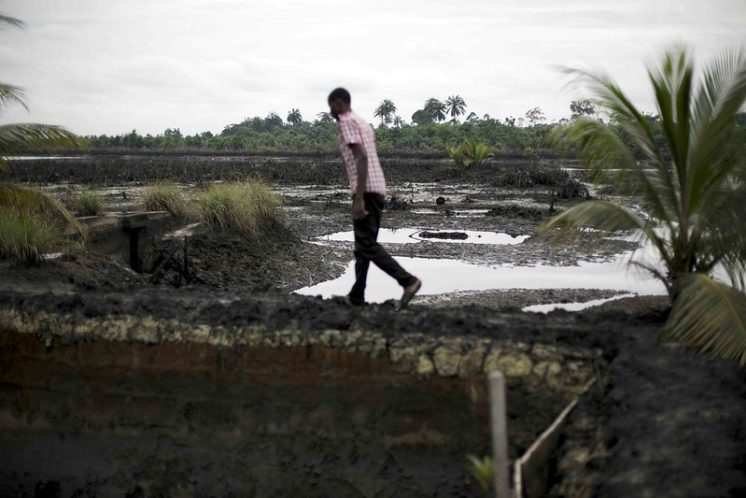In 2019, a subsidiary of the Italian oil giant Eni reached an out-of-court settlement with the Ikebiri community in Nigeria following a damaging oil spill. This case study illustrates how corporations use settlements to avoid accepting liability in the courts and having to admit any wrongdoing.
 Photo: Friends of the Earth International / Flickr
Photo: Friends of the Earth International / FlickrEni has been undertaking oil exploration and extraction operations in Nigeria since the 1960s. In 2010, equipment failure at one of its operations caused a damaging oil spill, when an oil pipeline operated by Eni’s subsidiary, the Nigerian Agip Oil Company (NAOC), burst 250 metres from a creek north of one of the local Ikebiri communities.[1] Estimations of the number of barrels ending up in the environment range from 50[2] to 150.[3] The spill affected fishing ponds and trees that were essential to the local community, thus irreparably damaging people’s livelihoods and affecting their health.[4]
Whilst the leak was repaired in 2010, and NAOC claims to have cleaned the area affected, Ikebiri community representatives have declared that no proper clean-up took place. They have complained that the leaked oil was just burnt without their consent – a dangerous and hazardous practice that neither rectified nor remediated the problem.[5]
In 2017, the Ikebiri community launched a court case against Eni in Milan, demanding a thorough clean-up of, and remedial compensation for, the 2010 oil spill caused by the failure of the pipeline operated its subsidiary.[6] This represented the first judicial case of its kind in Italy, namely the trial of an Italian multinational corporation for harms and rights violations perpetrated overseas in a foreign country. It also represented a test case for the proposition that Italian companies can be held liable for harms occurring in their overseas operations. If found to be the case, this could have sent a powerful message to large Italian multinationals – that they should undertake proper human rights due diligence across their overseas operations.
After years of slow progress, the filing of the court case set things in motion. Direct negotiations between the company and the community resumed, while Eni’s lawyers in the Italian court argued that Eni’s headquarters in Italy were not responsible for the spill. After some months of discussion through negotiations parallel to the court proceedings, NAOC reached an out-of-court and confidential settlement agreement with the community in October 2018. NAOC committed to overhauling existing electricity generator sets, renovating the community’s health centre, constructing four kilometres of concrete road and providing direct electricity.[7] The settlement addressed some of the community’s needs, but it did not involve cleaning the pollution from the spill.[8]
In its review comments to an earlier version of this case study, Eni reiterates that the spill was properly cleaned up back in 2010, certified by Nigeria’s Oil Spill Detection and Response Agency (NOSDRA), and therefore no further clean-up was required.[9] However, the reliability of this type of certification is not uncontested,[10] and the fact that the community went to court and that NAOC chose to settle suggests otherwise. However, since the court case never proceeded and the settlement agreement is confidential, no final conclusion can be made on this question. That does not alter the conclusion of this case study: that by means of the out-of-court settlement, a ruling was avoided on the crucial question of whether Eni could be held liable for harm caused by an overseas subsidiary.
[1] Manuela D’Allessandro, “Nigerian village sues Eni for damages from pipe explosion,” Reuters, May 4, 2017, https://www.reuters.com/article/us-eni-nigeria-court-idUSKBN1802JX (accessed October 22, 2019).
[2] Joint Investigation Visit Report. “Oil Spill Site Inspection Report: Summary Sheet,” April 5, 2010. http://www.foeeurope.org/sites/default/files/extractive_industries/2017/jiv-report-110410.pdf.
[3] Friends of the Earth Europe, “ENI and the Nigerian Ikebiri Case,” May 2017. http://www.foeeurope.org/sites/default/files/extractive_industries/2017/foee-eni-ikebiri-case-briefing-040517.pdf; Radio Mundo Real, “Making History: Interview with lawyer of landmark lawsuit against Italian oil company for crimes in Nigeria”, Audio recording, May 19, 2017, http://radiomundoreal.fm/9778-making-history-interview-with?lang=es (accessed October 22, 2019).
[4] Radio Mundo Real.
[5] Keating, Dave. “Nigerian King Takes Oil Spill Battle to Italy.” DW, July 11, 2017. https://www.dw.com/en/nigerian-king-takes-oil-spill-battle-to-italy/a-39636077.
[6] Friends of the Earth Europe, “Nigerian community’s oil pollution lawsuit against ENI begins,” January 9, 2018, http://www.foeeurope.org/nigerian-community-oil-pollution-eni-lawsuit-090118 (accessed October 22, 2019).
[7] Friends of the Earth Europe, “Ikebiri reach settlement with company, Niger Delta awaits justice,” May 28, 2019, https://www.foeeurope.org/ikebiri-settlement-niger-delta-280519 (accessed October 22, 2019).
[8] Eni. “Eni SpA Ordinary Shareholder’s Meeting: Answers to the Questions Received Prior to the Shareholders’ Meeting, Pursuant to Art. 127-Ter of Italian Legislative Decree No. 58/1998.” Eni, May 14, 2019. https://www.eni.com/assets/documents/Questions-and-Answers-before-the-the-Shareholders-Meeting-2019.pdf.
[9] Eni. “R: Review Announcement Case Description ENI/SETTLEMENT OF IKEBIRI COMMUNITY CLAIM,” May 6, 2020.
[10] Keating, Dave.
